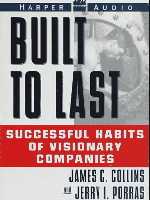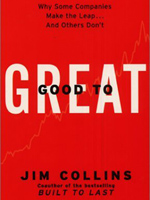“Trip reader” would be a good way to describe my style. Often I pick up a title in an airport concourse bookstore or some other place where I know that I am going to be isolated for a fixed period of time. As often as not, I will reach the end of the period of isolation before I reach the end of the book; the test of a really good book is whether I then stay up until I finish it. My shelves have many unfinished books on management, on sure-fire diets, on how to disappear, on ending procrastination, and on memory improvement. Good to Great and Built to Last I picked up in my accustomed style. It would be an exaggeration to say that I couldn’t put either one down, but neither stayed down for long.
 |
In reading these two works, I have come to the conviction that they offer something of significant value to the Association of Theological Schools, the agency for which I work, and to the 250 or so seminaries and theological schools that constitute the ATS membership. Built to Last identifies the successful habits of eighteen visionary companies. For each company, there is a comparable company, which makes it possible to draw conclusions that have some depth.
Good to Great identifies eleven companies that had “fifteen-year cumulative stock returns at or below the general stock market, punctuated by a transition point, then cumulative returns at least three times the market over the next fifteen years.” Collins describes seven elements that the research team found to be common among the eleven companies that made the transition from good to great: Level 5 Leadership, First Who … Then What, Confront the Brutal Facts (the Stockdale Complex), Hedgehog Concept (The Three Circles), Culture of Discipline, Technology Accelerators, and Flywheel Not Doom Loop.
Let me provide elaboration on one of these. “Level 5 leaders channel their ego needs away from themselves and into the larger goal of building a great company. It’s not that Level 5 leaders have no ego or self-interest. Indeed, they are incredibly ambitious — but their ambition is first and foremost for the institution, not themselves.” The book illustrates this type of leadership with Abraham Lincoln, “one of the few Level 5 presidents in United States history, who never let his ego get in the way of his primary ambition for the larger cause of an enduring great nation. Yet those who mistook [his] personal modesty, shy nature, and awkward manner as signs of weakness found themselves terribly mistaken.”
 |
And finally, “The great irony is that the animus and personal ambition that often drive people to positions of power stand at odds with the humility required of Level 5 leadership. When you combine that irony with the fact that boards of directors frequently operate under the false belief that they need to hire a larger-than-life, egocentric leader to make an organization great, you can quickly see why Level 5 leaders rarely appear at the top of our institutions.”
Late in Built to Last, in the chapter titled, “The End of the Beginning,” the authors offer their own four summary precepts:
- Be a clock builder — an architect — not a time teller.
- Embrace the Genius of the AND.
- Preserve the core/stimulate progress.
- Seek consistent alignment.
To be sure, it is unlikely every seminary or every foundation or every accrediting agency would be able to make the educational or eleemosynary or agency equivalent to the business transition from good to great. There is not sufficient room at the top. In the nature of things, not all would believe that Collins got it right or that if he did, that it has any relevance to theological schools or to grant-making or to accrediting.
But to those who intuit that there is a parallel between what happened, and more importantly, why it happened, that enabled the eleven companies to become great and what could happen and how in a theological school and at a foundation or an accrediting agency… the consequences will be enormous.
Louis Charles Willard is the director for accreditation and institutional evaluation with the Association of Theological Schools, Pittsburgh, Pennsylvania.




























